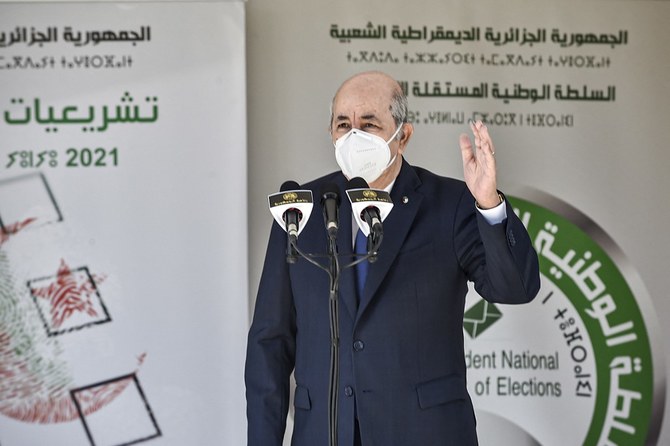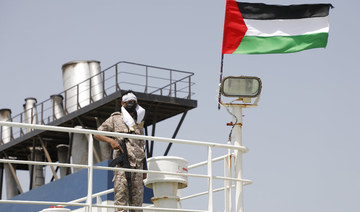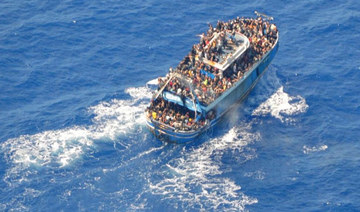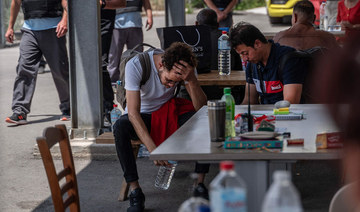ALGIERS: Algerian President Abdelmadjid Tebboune on Wednesday named a new government, with the energy and finance ministers from the previous administration both keeping their jobs, the presidency said.
It said Ramdane Lamamra was appointed as foreign minister, taking over from Sabri Boukadoum.
Appointed last week as prime minister to replace Abdeaziz Djerad, Ayman Benabderrahmane, who was finance minister in the previous government, will remain in charge of finance, while Mohamed Arkab kept his job as energy minister, the presidency said in a statement read out by a spokesman on state television.
OPEC member Algeria has been trying to extract itself from a financial and economic crisis that has caused budget and trade deficits after a fall in energy export revenues, the main source of state finances.
Elected in December 2019 after mass protests forced his predecessor Abdelaziz Bouteflika to step down, Tebboune has promised to carry out political and economic reforms.
He has said most planned reforms have been delayed due to the global pandemic that deepened the crisis in Algeria and worsened its financial situation.
Tebboune's plans involve mainly developing the non-energy sector, including agriculture, as the North African nation imports most of its food needs.
The new foreign minister, Lamamra, had held the role several times under former president Bouteflika.
Most ministers in the previous administration maintained their jobs in the new cabinet.
Algeria forms new government with energy and finance ministers unchanged
https://arab.news/ykbcb
Algeria forms new government with energy and finance ministers unchanged

- Ramdane Lamamra was appointed as foreign minister, taking over from Sabri Boukadoum
- Most ministers in the previous administration maintained their jobs in the new cabinet
US destroys 4 Houthi drones in Yemen

- CENTCOM: These actions are taken to protect freedom of navigation and make international waters safer and more secure for US, coalition, and merchant vessels
- Prime minister accuses militia of trying to bankrupt the government by attacking oil terminals
AL-MUKALLA: The US Central Command said on Thursday morning, Yemen time, that its forces had destroyed four drones in an area controlled by the Houthi militia, thwarting a strike on ships in international commercial waterways.
“These actions are taken to protect freedom of navigation and make international waters safer and more secure for US, coalition, and merchant vessels,” CENTCOM said in a statement.
This is the latest round of US military operations against sites in Yemen under Houthi control to pre-emptively destroy drones and missiles before they can be used against commercial and navy ships in the Red Sea, Bab Al-Mandab Strait and Gulf of Aden.
The CENTCOM announcement came as Houthi officials reaffirmed their warnings to expand their assaults on ships if Israel did not halt its war in the Gaza Strip.
Mahdi Al-Mashat, leader of the militia’s Supreme Political Council, said that they will launch attacks on ships during the fourth phase of their campaign in support of Palestine, which involves targeting ships in the Mediterranean until Israel ends the war and the blockade of Gaza.
“We have decisive, bold, and difficult choices if the aggression against our people in Gaza continues,” Al-Mashat said, according to the Houthi-run Saba news agency.
The militia’s leader, Abdul Malik Al-Houthi, said on Thursday that his forces had fired 211 missiles at Israel and carried out more than 100 attacks on US warships in the Red Sea since the start of their campaign in November.
He urged Iraqis to join them in their operations to support the Palestinian people.
“Companies that transport goods to the Israeli enemy will have their ships attacked anywhere within reach of the Yemeni army's capabilities,” Al-Houthi said.
Since November, the Houthis have destroyed one commercial ship, captured another, and launched hundreds of ballistic missiles and drones at commercial ships and warships along international shipping lanes near Yemen, mostly in the Red Sea.
The Houthis say the attacks are intended to compel Israel to halt its blockade of Gaza, and have targeted US and UK ships because both countries attacked Yemen.
Yemeni government officials accuse the Houthis of leveraging Yemen’s widespread anger over Israel’s war in Gaza to shore up their dwindling popular support, recruit new fighters, and justify continuing military operations throughout Yemen.
Speaking to leaders at the Arab summit in Bahrain on Thursday, Rashad Al-Alimi, head of Yemen’s internationally recognized Presidential Leadership Council, branded the Houthis as a “rogue” force that poses a significant danger to regional and international security.
He accused the Houthis of killing more than 500,000 Yemenis, displacing four million more, torching hundreds of homes and mosques, besieging towns, seizing Yemeni property, and generating the world’s greatest humanitarian catastrophe.
“The Yemen war, which was instigated a decade ago by Iran-backed militia, will continue to be one of the biggest challenges to Arab nations and their people’s interests,” Al-Alimi said.
At the same time, Yemen’s Prime Minister Ahmed Awadh bin Mubarak accused the Houthis of attempting to bankrupt his government by attacking oil terminals in the government-controlled provinces of Hadramout and Shabwa, preventing traders from importing goods through Aden ports, while banning the import of gas from the central city of Marib.
He said that the Houthis’ efforts, which he described as an economic war, had cost the Yemeni government 3.3 trillion Yemeni riyals ($13.2 billion) in lost income since October 2022.
“The Houthis are using all of their cards, including the economic war, to accomplish political goals,” bin Mubarak said in an interview with the national TV on Wednesday.
Israel army says two Thai hostages held in Gaza are dead

- There are now six Thai hostages being held in Gaza
JERUSALEM: The Israeli army said Thursday that two Thai hostages earlier believed to be alive in Gaza were killed in the October 7 attack and their bodies are being held in the Palestinian territory.
“We informed the families of two kidnapped Thai citizens, who worked in agriculture in the plantations near Kibbutz Beeri, that they were murdered in the terrorist attack on October 7 and their bodies are being held by Hamas,” said army spokesman Daniel Hagari.
There are now six Thai hostages being held in Gaza, according to an AFP tally based on Israeli figures.
Thailand has about 30,000 citizens in Israel, most of whom work in the agricultural sector.
Hamas’s October 7 attack on southern Israel resulted in the deaths of more than 1,170 people, mostly civilians, according to an AFP tally of Israeli official figures.
Israel’s military retaliation has killed at least 35,272 people, also mostly civilians, according to the health ministry in the Hamas-run Gaza Strip.
A Palestinian converted to Judaism, killed by an Israeli soldier who saw him as a threat

- His unusual journey had taken him across some of the deepest fault lines in the Middle East and led to some unlikely friendships
- In his final moments, he was once again viewed as a Palestinian who was in the wrong place, at a time of widespread anger and suspicion
JERUSALEM: At first, it seemed like the kind of shooting that has become all too common in the Israeli-occupied West Bank. A Palestinian aroused suspicions and an Israeli soldier killed him.
But then the deceased was identified as David Ben-Avraham, a Palestinian who had made the almost unheard-of decision to convert from Islam to Judaism years earlier.
His unusual journey had taken him across some of the deepest fault lines in the Middle East and led to some unlikely friendships. Most Palestinians saw him as an eccentric outcast, while many Israelis treated him as an unwelcome convert to a religion that doesn’t proselytize.
But in his final moments, he was once again viewed as a Palestinian who was in the wrong place, at a time of widespread anger and suspicion.
A DIVIDED CITY
He was born Sameh Zeitoun in Hebron, home to some 200,000 Palestinians as well as hundreds of Jewish settlers who live in enclaves guarded by Israeli troops. Tensions have run high for decades, often spilling over into violence.
Rights groups have long accused Hebron’s settlers of harassing Palestinian residents, and Palestinians have committed a number of stabbing and shooting attacks against Israelis over the years.
At its most extreme, the bitter neighbors live just a few meters apart. In some narrow alleys of Hebron’s Old City, metal netting protects Palestinian shoppers from objects thrown by settlers living on the upper floors.
Zeitoun first made contact with Jewish settlers over a decade ago, asking for help converting to Judaism, according to Noam Arnon, a Jewish settler in Hebron who went on to befriend him.
He said Zeitoun was inspired by family stories about his grandfather protecting Jews when riots erupted in 1929, when the Holy Land was under British colonial rule. Palestinians killed dozens of Jewish residents in the city.
“He went further, not only to live as a good neighbor but to join the Jewish community,” Arnon recounted.
A RARE CONVERSION
Conversion to other faiths is deeply frowned upon in Islam. In much of the Muslim world, those who do so are cast out of their communities, sometimes violently. Judaism, unlike Islam and Christianity, has no tradition of proselytization.
Such a conversion is even more fraught in Israel and the Palestinian territories, where religion and nationality usually overlap in a decades-old conflict. Judaism is the faith of most of the soldiers who patrol the territory and the settlers whom Palestinians see as hostile colonizers.
Arnon said most of the settlers from Hebron’s tight-knit community refused to accept Ben-Avraham. Only Arnon and a few others interacted with him, helping with his conversion application papers.
Religious conversions are rare but legal in areas administered by the semi-autonomous Palestinian Authority. Most are undertaken by Palestinian Christians converting to Islam for marriage.
In Israel, converting to Judaism requires an application to the government-run Conversion Authority. Ben-Avraham submitted two requests in 2018 but did not meet the requirements, according to a government official who was not authorized to speak with media and spoke on condition of anonymity.
With that pathway closed, Ben Avraham turned to Israel’s insular ultra-Orthodox community and eventually made his conversion official in 2020, according to documents published online.
AN ARREST
In the year before his conversion, Ben-Avraham was detained by the Palestinian Authority’s intelligence unit in Hebron, according to Arnon and a local Palestinian activist, Issa Amro.
The reason for his arrest was never publicly disclosed, but they believe his conversion and open connections with Israelis attracted unwanted attention.
Palestinians can face arrest or even death if they’re seen as collaborating with Israeli authorities. But few would have suspected Ben-Avraham of being an informant because his story was widely known.
Ben-Avraham told the Israeli news site Times of Israel that he was held for two months in solitary confinement and beaten before being released. Around that time, a video emerged showing him holding what appears to be a Qur’an and pledging his Muslim faith.
Arnon and Amro said his statement was likely made under duress during detention. The PA’s prosecution office said it had no information about his case.
After his release, Ben-Avraham moved in with Haim Parag, a Jewish friend who lived in Jerusalem. He returned to Hebron infrequently because of safety concerns and continued his Jewish studies. Parag said the pair regularly prayed together at a nearby synagogue.
“He was like a son to me,” he said.
Parag also said he met Ben-Avraham’s wife and some of his children, and that several close family members maintained a relationship with him even after his conversion.
The Zeitoun family declined to speak with The Associated Press, fearing reprisal. In the end, Ben-Avraham left little public record of what drove his personal convictions.
A DEADLY SHOOTING
Ben-Avraham was waiting outside a West Bank settlement for an Israeli bus to take him to Parag’s apartment March 19 when he got into an argument in Hebrew with an Israeli soldier.
Across the West Bank, Jewish settlers live apart from Palestinians in guarded settlements where they’re subject to different laws. Palestinians are generally barred from entering settlements unless they have work permits.
“Are you Jewish?” the soldier shouts in a video that circulated online and appears to have been shot by his body camera.
“Of course,” Ben Avraham answers.
“What’s your name?” the soldier says.
“David.” he replies.
“David?” the soldier says.
“Ben-Avraham, stupid.”
The soldier then orders Ben-Avraham to step away from his bag on the ground and raise his hands in the air, before saying sarcastically, “Jewish.”
A second video, apparently taken from a nearby security camera, appears to show two soldiers shooting Ben-Avraham from a close distance as he keels over backward onto the sidewalk.
The army said a small knife was found in Ben Avraham’s bag after the shooting. Parag said he gave him the knife for self-defense.
The Israeli army said it’s investigating the shooting, but rights groups say soldiers are rarely held accountable in such situations.
Israeli forces have been on high alert as the West Bank has seen a surge of violence linked to the war in Gaza. Nearly 500 Palestinians have been killed by Israeli fire since the war’s start, according to the Palestinian Health Ministry. Many have been shot dead in armed clashes during military raids, others for throwing stones at troops, and some who were posing no apparent threat.
Palestinians have also carried out several stabbing and other attacks against Israelis.
Arnon said the shooting was a tragic misunderstanding. Parag, Ben-Avraham’s friend in Jerusalem, accused the soldiers of racial profiling, saying they saw Ben-Avraham for his background and not his unexpected beliefs.
A FUNERAL
Even in death, Ben-Avraham’s identity was contested.
Parag and another Israeli friend asked an Israeli court for the body to buried him at a Jewish cemetery, filing a petition against members of the Zeitoun family who wanted a Muslim funeral. Bezalel Hochman, a lawyer representing the two Israelis, said the Tel Aviv family court ruled in their favor.
After his death caused a public outcry, the Interior Ministry granted him Israeli residency, saying it wanted “to fulfill the will and desire of the deceased to be part of the nation of Israel.”
Ben Avraham was buried in April in a Jewish cemetery on the foothills of Mount Gerizim, near the Palestinian city of Nablus, Parag said. The hilltop is sacred for Samaritans — a small, ancient religious minority that straddles the Palestinian-Israeli divide, just like Ben-Avraham.
No one from the Zeitoun family attended the funeral, said Parag, who’s designing his friend’s gravestone.
He said it will read: “David Ben-Avraham Zeitoun Parag. The Holy Jew.”
Hamas authorities say over 100 academics killed in Gaza war

- Among those on the list of 104 names is Sufyan Tayeh, who was the president of the Islamic University and a leading researcher in physics and applied mathematics
- Top surgeon and professor of medicine Adnan Al-Barsh was also listed
GAZA STRIP, Palestinian Territories: Gaza authorities released a list on Thursday of more than 100 academics and researchers they say have been killed by Israeli forces since war broke out over seven months ago.
“We strongly condemn the occupation’s assassination of scientists, academics, university professors and researchers, who are a distinguished group in the Palestinian society in the Gaza Strip,” the Hamas government’s media office said in a statement.
“This sends a clear message that they aim to completely eliminate scientists and researchers in the educational sector,” it added.
Among those on the list of 104 names is Sufyan Tayeh, who was the president of the Islamic University and a leading researcher in physics and applied mathematics.
Top surgeon and professor of medicine Adnan Al-Barsh was also listed.
According to the Palestinian Prisoners Club, Barsh, 50, died in Israeli custody on April 19 after being detained with other doctors at Al-Awda Hospital in northern Gaza last December.
Asked at the time about his reported death in custody, the Israeli army said it was “currently not aware of such (an) incident.”
The Hamas government called on the “free countries of the world and all organizations related to education and higher education worldwide to condemn this historical crime and to pressure the occupation to stop the genocidal war.”
Its statement came against the backdrop of student protests against Israel’s conduct of the war on campuses across the United States and beyond.
Many of the demonstrators have called on their universities to divest from companies that allegedly contribute to human rights violations in the occupied Palestinian territories.
The bloodiest ever war in Gaza broke out when Hamas launched a surprise attack on Israel on October 7 that resulted in the deaths of more than 1,170 people, mostly civilians, according to an AFP tally of Israeli official figures.
Israel’s retaliatory war against Hamas has killed at least 35,272 people in Gaza, mostly women and children, according to the Hamas-ruled territory’s health ministry.
Greek defense team says 9 Egyptians accused of causing deadly shipwreck were misidentified as crew

- The nine are due to go on trial in Kalamata on May 21 on a series of charges, including migrant smuggling, participation in a criminal organization and causing a deadly shipwreck
- They face multiple life sentences if convicted
ATHENS: The legal defense team for nine Egyptian men due to go on trial in southern Greece next week accused of causing one of the Mediterranean’s deadliest shipwrecks said Thursday they will argue that Greece has no jurisdiction in the case, and insisted their clients were innocent survivors who have been unjustly prosecuted.
The nine, whose ages range from early 20s to early 40s, are due to go on trial in the southern city of Kalamata on May 21 on a series of charges, including migrant smuggling, participation in a criminal organization and causing a deadly shipwreck. They face multiple life sentences if convicted.
The Adriana, an overcrowded fishing trawler, had been sailing from Libya to Italy with hundreds of asylum-seekers on board when it sank on June 14 in international waters off the southwestern coast of Greece.
The exact number of people on board has never been established, but estimates range from around 500 to more than 700. Only 104 people survived — all men and boys from Syria, Egypt, Pakistan and two Palestinians — and about 80 bodies were recovered. The vessel sank in one of the Mediterranean’s deepest areas, making recovery efforts all but impossible.
The Greek lawyers who make up the defense team spoke during a news conference in Athens on Thursday. They maintained their clients’ innocence, saying all nine defendants had been paying passengers who had been misidentified as crew members by other survivors who gave testimonies under duress just hours after having been rescued.
The nine “are random people, smuggled people who paid the same amounts as all the others to take this trip to Italy aiming for a better life, and they are accused of being part of the smuggling team,” lawyer and defense team member Vicky Aggelidou said.
Dimitris Choulis, another lawyer and member of the legal team, said that Greek authorities named the defendants as crew members following testimonies by nine other survivors who identified them for having done things as simple as handing bottles of water or pieces of fruit to other passengers.
“For nearly a year now, nine people have been in prison without knowing what they are in prison for,” Choulis said.
“For me, it is very sad to visit and see people in prison who do not understand why they are there,” he added.
While the Adriana was sailing in international waters, the area was within Greece’s search and rescue zone of responsibility. Greece’s coast guard had been shadowing the vessel for a full day without attempting a rescue of those on board. A patrol boat and at least two merchant ships were in the vicinity when the trawler capsized and sank.
In the aftermath of the sinking, some survivors said the coast guard had been attempting to tow the boat when it sank, and rights activists have accused Greek authorities of triggering the shipwreck while attempting to tow the boat out of Greece’s zone of responsibility.
Greek authorities have rejected accusations of triggering the shipwreck and have insisted the trawler’s crew members had refused to accept help from the nearby merchant ships and from the Greek coast guard.
A separate investigation being carried out by Greece’s naval court hasn’t yet reached any conclusion, and the defense team hasn’t been given any access to any part of it.
The Egyptians’ defense team also argues that because the shipwreck occurred in international waters, Greek courts don’t have jurisdiction to try the case, and the defense will move to have the case dismissed on those grounds when the trial opens in Kalamata next week.
Greece lies along one of the most popular routes into the European Union for people fleeing war and poverty in the Middle East, Africa and Asia. While most of those cross into the country’s eastern Aegean Sea islands from the nearby Turkish coast, others try to skirt Greece altogether and head from north Africa to Italy across the longer and more dangerous Mediterranean route.
On Thursday, Greece’s coast guard said that 42 people had been rescued and another three were believed to be missing after a boat carrying migrants sent out a distress call while sailing south of the Greek island of Crete.
Officials said they were alerted by the Italian coast guard overnight about a boat in distress 27 nautical miles (31 miles or 50 kilometers) south of Crete. Greece’s coast guard said that 40 people were rescued by nearby ships, and another two were rescued by a Greek navy helicopter.
A search and rescue operation was underway for three people reported by survivors as still missing. It wasn’t immediately clear what kind of vessel the passengers had been on, or why the boat sent out a distress call.






















